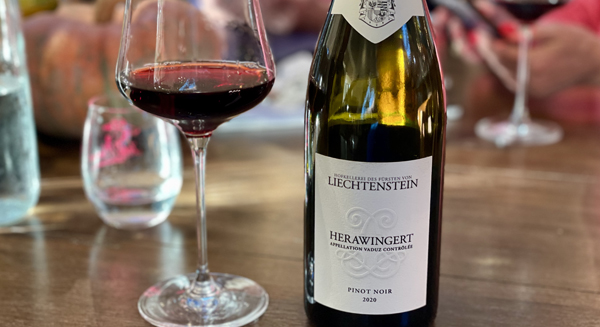2020 Hofkellerei des Fürsten von Liechtenstein, Pinot Noir, Herawingert – Appellation Vaduz Contrôlée, Liechtenstein.
The words, seductive, sultry and depth, came to mind on my first ever taste of wine made in the tiny alpine country of Liechtenstein, which graced my palate to a huge and pleasing surprise with pure Pinot character and elegant Burgundy like finesse and old world charm. Honestly if tasted blind I’d have certainly put Côte de Beaune and places like Volnay or Savigny-les-Beaune top of the list, such was the quality of this beautiful rarity from the royal Liechtenstein family and their vineyards near the source of the Rhein River. The 2020 vintage, maybe flatters the region with ripe concentration, but this high alpine Pinot Noir is absolutely delicious stuff with silken layers of black cherry, brambly red berry, plum and earthy currant fruits leading the way in the mouth, accented nicely by briar spice, umami, wilted roses, orange tea, garden herbs and subtle wood notes. This wine is richer, with a dark(er) garnet/ruby hue, than the normal Swiss versions, and more French in style, rather than German or Austrian Pinot, and it displays lovely raw and transparent flavors that really open up nicely with air, gaining a medium body, more floral aromatics and a more supple mouth feel. Made from organic grapes in the Herawingert vineyard, of the Vaduz wine region, which has just three main wineries, but over 100 growers. This unique terroir is set on calcareous soils and sees a remarkable 1,500 hours of sunshine a year, allowing for the quality and ripening conditions, as seen in this Pinot Noir. Obviously a curiosity and small production, the cost here shouldn’t keep you from buying this one, but it will be a difficult get for us in the States.
The history books will tell you that Prince Hans Adam von Liechtenstein acquired the Fiefdom of Schellenberg in 1699 and the County of Vaduz in 1712, after which on January 23rd, 1719, Emperor Charles VI unified the County of Vaduz with the Fiefdom of Schellenberg by a certificate and elevated them to an imperial principality named Liechtenstein. Thus becoming the smallest country with two borders, it is a tiny landlocked country in the Central European Alps, tucked between Austria and Switzerland. Interestingly I learned, thanks to Roxanne and Tamara at Carmel’s Lady Somm, that the royal family of Liechtenstein has been deeply connected to viticulture since 1436, with holdings throughout Europe. Today, they say they have a passionate new generation in charge of the wine for them that is led by oenologists Natalie Ströhle and Josef Stumvoll, who continues this long-standing tradition at the family’s wineries in Liechtenstein and in Austria, near Vienna and the Wachau. All the wines come from carefully cultivated, biodynamic and regeneratively farmed vineyards in the Weinviertel, Leithaberg, and the Alpine Rhine Valley, where this Pinot Noir was made. These precise wines are crafted with minimal intervention and are lean into a fresh, elegant and distinctive style. The winey says they are produced through a modern clean, yet traditional approach, with a gentle processing, and a focus on natural expression of terroir. The wine, which sees full de-stemming and usually native yeast fermentation, gets aged in classic, mostly used Burgundy barrels and released when the family believes things are ready, which has all worked out nicely in this one.
($70 Est.) 94 Points, grapelive
